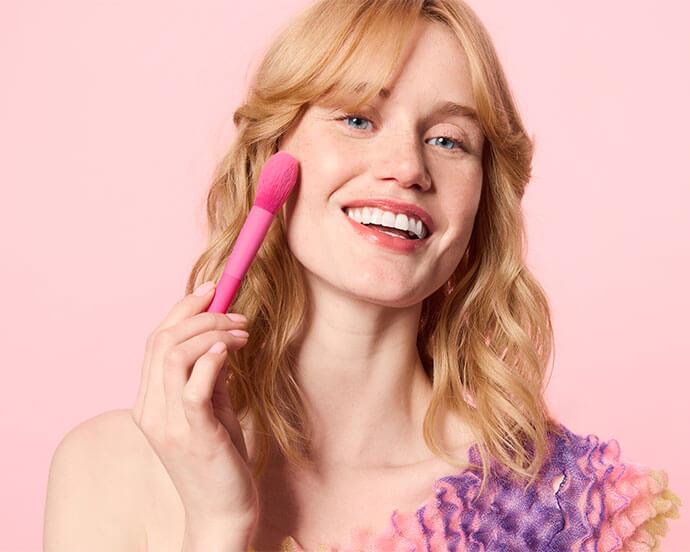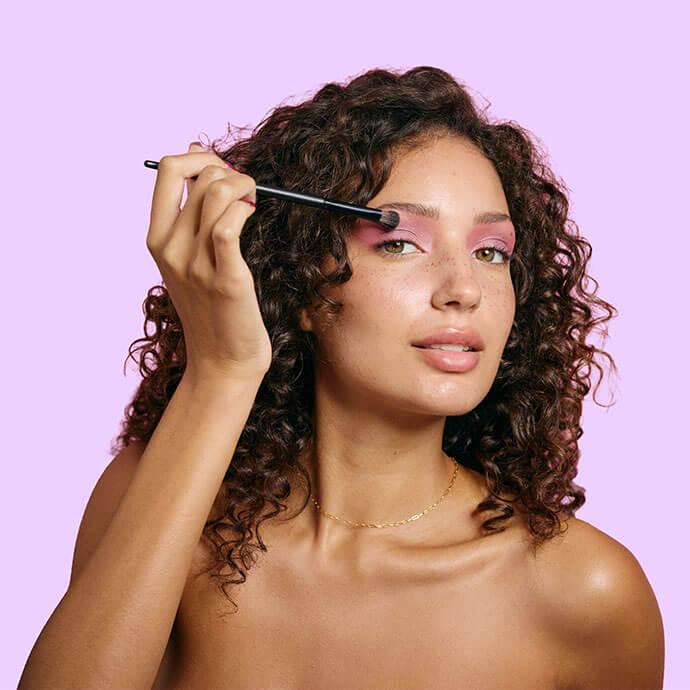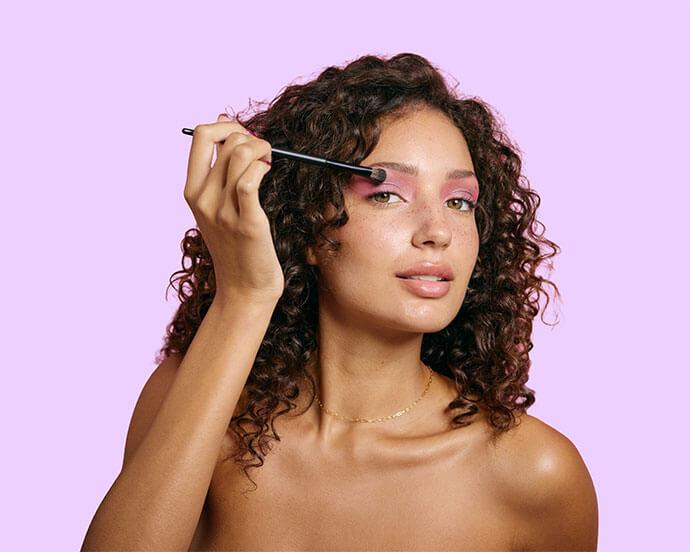Could Stress Be Causing Your Hair To Fall Out?



Katrina Mitzeliotis Lanza


While shedding up to 100 hairs a day is totally normal, chances are if you’ve noticed a concerning amount of hair fall out on your pillow or in your shower drain there’s a bigger issue at play. While there are a variety of factors that can cause hair loss, many don’t realize that chronic stress could also be the culprit. Not sure if what you’re seeing is normal hair loss or something more? We’re breaking down the common types of hair loss caused by severe stress and offering up treatment options to save your tresses.
When is hair loss normal?
While daily hair shedding is normal, hormones, genetics, your metabolism, and even heat styling can also be responsible for your hair loss. “It's normal to lose up to 100 hairs a day, and you may experience periods of intense shedding after physical or emotional stress, such as surgery or a bad breakup,” says dermatologist Jessie Cheung, MD.
If you noticed you’re losing more hair after a trip to the salon, it could be time to reevaluate your styling. “Heat and chemical styling will weaken the hair strand, making your hair more prone to breaking,” says Dr. Cheung. “Chemicals can also irritate the hair follicle, leading to shedding or inflammation and scarring.”


It's about glam time you treated yourself.
MEET THE EXPERT
Jessie Cheung, MD, is a board-certified dermatologist and founder of Cheung Aesthetics and Wellness in Chicago. She specialises in both surgical and cosmetic procedures.
While thinning hair naturally occurs while we age, unfortunately genetics might also be responsible. Over time, the hair follicle shrinks and each strand gets skinnier as the hair cycle slows down. “How your body responds to aging is determined by your environment and the genes you inherit from both sides,” says Dr. Cheung.
How can you tell if your shedding is more serious? If your hair loss doesn’t slow after three months, it might be best to visit a dermatologist who can determine if your shedding is caused by underlying issues, like high stress levels. “Shedding tends to slow down after a few months and should be accompanied with regrowth,” says Dr. Cheung.
When is hair loss related to stress?
You’re probably aware of the ways stress can wreak havoc on your skin, but it’s also detrimental to your hair health. What makes hair loss caused by stress even more difficult to diagnose is that it could occur in a variety of ways.
Telogen effluvium: Do you feel like you’re shedding more than ever before? You may suffer from telogen effluvium, a widespread form of hair loss that happens when the hair growth cycle is cut short by an internal disturbance. “This excessive shedding of resting hairs occurs after a metabolic shock, such as postpartum, crash dieting, or stress,” says Dr. Cheung. Normally 15% of scalp hair is in the shedding (telogen) phase. “When your system is shocked, as many as 70% of your active anagen (growth) hairs get pushed into the telogen phase, and then fall out,” says Dr. Cheung. If you suffer from telogen effluvium you’ll find clumps of hair in your brush, on your pillow, or in the shower. Common causes include hormonal changes, vitamin imbalances, and deficiencies. When we’re stressed, we’re more likely to skip meals and reach for quick, processed foods--the lack of proper nutrients trickles down and directly impacts the health of our hair. In order to stop your hair from shedding, Dr. Cheung recommends taking nutraceuticals and adopting a healthy diet to correct underlying deficiencies and hormone imbalances to boost hair growth.
Alopecia areata: Unlike widespread shedding seen in telogen effluvium, this autoimmune disease results in random, circular bald spots. “Alopecia areata occurs when your immune system attacks your hair follicles, resulting in a shiny bald spot,” says Dr. Cheung. While some patients report no symptoms at all, others experience a burning, itching sensation. “Alopecia areata can be triggered by viral infection, trauma, hormone disorders, or stressors,” says Dr. Cheung. Most cases are associated with stress, shock, an accident, loss, or illness. While some experience spontaneous hair regrowth many turn to immune-modulating medication to correct the condition. “Topical and injectable steroids are commonly used for small areas, and oral steroids or injectable biologics are used for stubborn cases,” says Dr. Cheung.
Trichotillomania: This hair pulling disorder occurs when you have an urge to pull hair out of the scalp, brows, or lashes. “It's more common in children, in pre-school years and around puberty, especially in females, and may develop as a coping mechanism triggered by stress and anxiety,” says Dr. Cheung. It could also be a side effect of suffering a traumatic experience. While some people may not be aware of the habit, others experience a sense of relief. “Symptoms include stubbly hairs of different lengths, and irregularly shaped bald patches, often on the same side of the dominant hand,” says Dr. Cheung. It can also lead to scarring or permanent damage to the hair follicle. Of all hair loss disorders, trichotillomania is complex and requires psychological treatment. “Treatment starts with behavioral therapy, and can include prescription anti-depressants,” says Dr. Cheung.
How to relieve your stress?
The key to improving your hair health? Stress management. To lower stress levels, engage in relaxing activities like yoga, meditation, deep breathing techniques, or simply spending some time outside. If you suffer from trichotillomania, Dr. Cheung also suggests using a fidget spinner to distract until the urge passes. “A holistic approach includes boosting serotonin and dopamine with pre- and probiotics, tryptophan supplements, bright light exposure, and endorphin-inducing exercise,” says Dr. Cheung.
While stress-related hair loss can make you feel self-conscious, with the right treatment plan you can reserve the impact stress is having on your tresses.
Want in on all the Glam Bag fun? Take our Beauty Quiz now to get started. Already an Ipster? Refer your friends to earn points, which you can use toward products. Either way, don’t forget to check us out on Instagram and Twitter @IPSY.
Liked this post? Share!
Related Stories


How-To
Blush 101: Your Go-To Guide on How to Apply Blush for Your Face Shape
Published on Dec 12, 2025 • 12 min read


How-To
How to Apply Eyeshadow: A Beginner’s Guide to Flawless Eye Looks
Published on Dec 4, 2025 • 10 min read


How-To
How to Do Winged Eyeliner Like a Pro (No Steady Hand Required)
Published on Dec 3, 2025 • 9 min read
How-To
Try a Soft Goth Aesthetic This Season to Evoke Your Inner Wednesday Addams
Published on Feb 23, 2023


How-To
Everything You’ve Ever Wanted to Know About Mastering the Art of Bronzer
Published on Nov 5, 2025 • 10 min read


How-To
Blush Sticks 101: How to Apply Them and the Best Blush Sticks to Use
Published on Nov 5, 2025 • 13 min read


How-To
How to Treat Yourself: 39 Simple Self-Care Ideas
Published on Oct 22, 2025 • 15 min read


How-To
How to Cover Melasma With Makeup Like a Pro in 4 Simple Steps
Published on Sep 26, 2025 • 5 min read


Beauty Picked Just for You
Get 5 products worth up to $70
Plus exclusive access to epic deals up to 80% off
Starting at just $14/month. Cancel anytime.